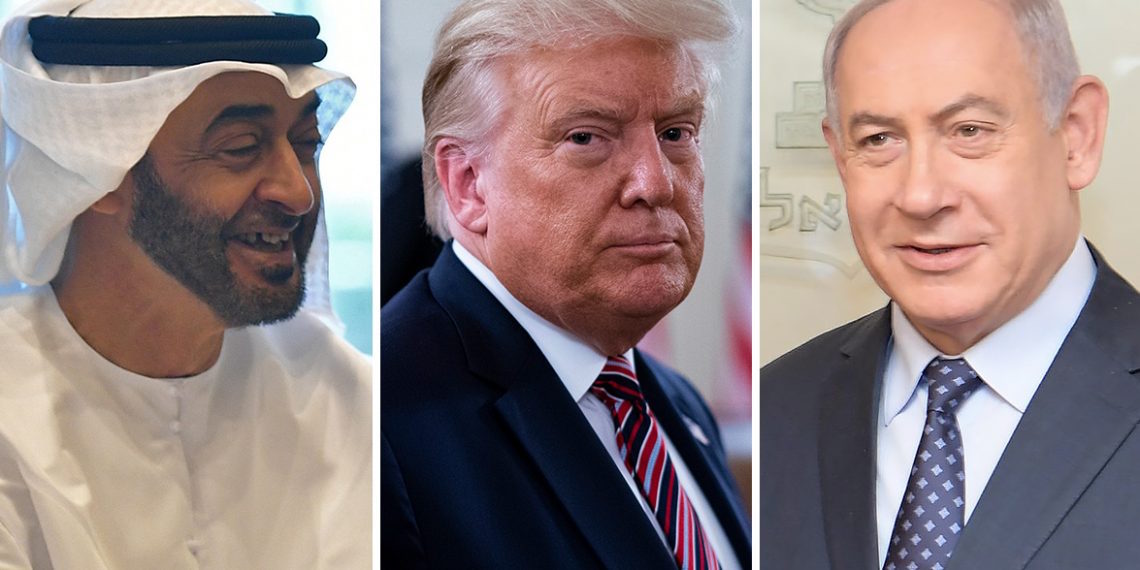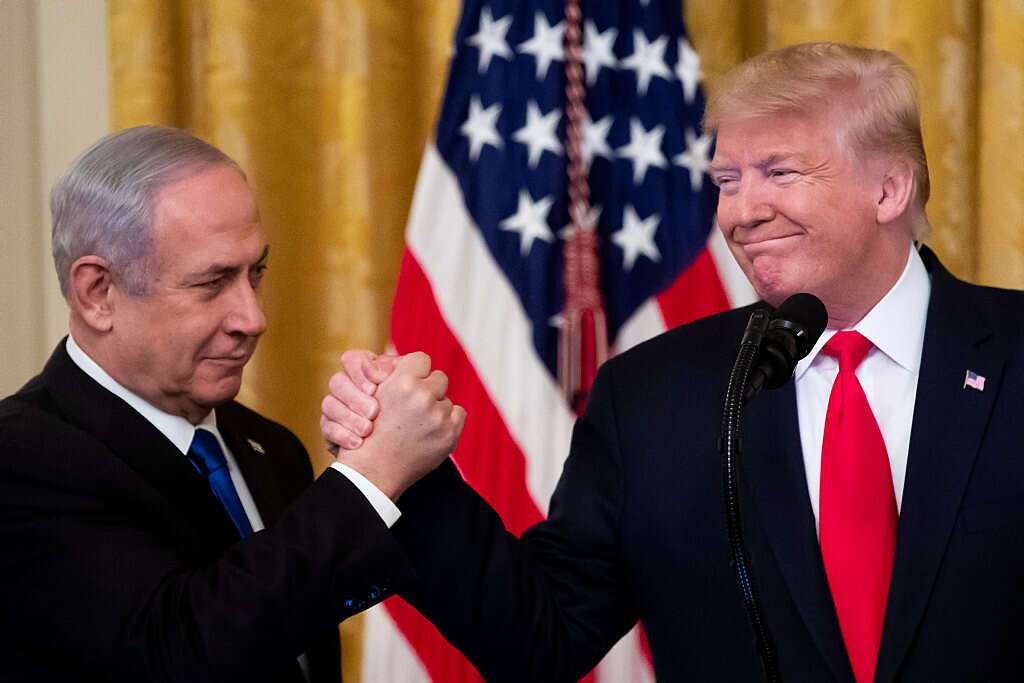
Trump, Israel, UAE Announce Historic Peace Deal
Agreement is the product of lengthy negotiations between Washington, Jerusalem and Abu Dhabi. As part of the deal, Israel agrees to suspend plans to extend sovereignty to parts of Judea and Samaria and the Jordan Valley.
The United Arab Emirates and Israel have agreed to establish full diplomatic ties, US President Donald Trump announced on Thursday. This makes the UAE the first Persian Gulf state to forge official diplomatic relations with Israel and the third Arab country overall to normalize relations with the Jewish state, following in the footsteps of Egypt and Jordan.
As part of the deal, Israel agreed to suspend plans to extend sovereignty to large parts of Judea and Samaria and the Jordan Valley.
Trump tweeted a statement from the countries, acknowledging the deal. He then told reporters in the Oval Office that it was “a truly historic moment.”
“Now that the ice has been broken I expect more Arab and Muslim countries will follow the United Arab Emirates,” he said.
Delegations from the United Arab Emirates and Israel will meet during the coming weeks to sign bilateral agreements on areas including energy, tourism, direct flights, investment, security, communication, and technology, the UAE Foreign Ministry said.
Abu Dhabi’s Crown Prince Sheikh Mohammed Bin Zayed said on Twitter on Thursday that an agreement had been reached on normalizing relations between the two countries.
The recognition grants a rare diplomatic win to Trump ahead of the November election as his efforts to see an end to the war in Afghanistan have yet to come to fruition while efforts to bring peace between Israel and the Palestinians have made no headway. Israel and the UAE also have been among Trump’s closest foreign allies.
For Israel, the announcement comes after years of boasting by Israeli Prime Minister Benjamin Netanyahu that his government enjoys closer ties to Arab nations than publicly acknowledged.

For the UAE, home to skyscraper-studded Dubai and the rolling, oil-rich sand dunes of Abu Dhabi, it further burnishes its international campaign to be seen as a beacon of tolerance in the Middle East despite being governed by autocratic rulers. It also puts the UAE out first in a regional recognition race among neighboring Gulf Arab states.
And for the Palestinians, who long have relied on Arab backing in their struggle for independence, the announcement marked both a win and setback. While Thursday’s deal halts Israeli annexation plans, the Palestinians have repeatedly urged Arab governments not to normalize relations with Israel until a peace agreement establishing an independent Palestinian state is reached.
The joint statement from the US, the UAE and Israel said delegations would meet in the coming weeks to sign deals on direct flights, security, telecommunications, energy, tourism and health care. The two countries also will partner on fighting the coronavirus pandemic.
“Opening direct ties between two of the Middle East’s most dynamic societies and advanced economics will transform the region by spurring economic growth, enhancing technological innovation and forging closer people-to-people relations,” said the statement by Trump, Netanyahu and Abu Dhabi Crown Prince Mohammed bin Zayed Al Nahyan, the day-to-day ruler of the UAE. It said the leaders had a three-way call discussing the deal.

Netanyahu tweeted an Israeli flag with a short message in Hebrew: “Historic Day.”
In a special press briefing held on Thursday night, the prime minister
Netanyahu said Israel and UAE plan to pursue full diplomatic and economic ties, including the exchange of embassies, ambassadors, economic ties and direct flights.
“This is very important for our economy, the regional economy and our future, he said.
He further thanked Trump and Crown Prince al-Nahyan, saying, “This historic day is akin to when Israeli signed the peace treaty with Egypt and Jordan.
“I have been working toward the goal of normalizing ties with Gulf stats since 2009. I always thought it was possible [and] I have been pursuing this constantly, for years,” he said.
Touching on his 2018 visit to Oman and meetings held in early 2020 with Sudanese officials in Uganda, Netanyahu stressed that the peace deal with the UAE “shows the huge change in how Israel is seen in the Middle East. I am sure more Arab countries will establish ties with Israel.”
Among Arab nations, only Egypt and Jordan have active diplomatic ties with Israel. Egypt made a peace deal with Israel in 1979, followed by Jordan in 1994. Mauritania recognized Israel in 1999, but later ended relations in 2009 over Israel’s war in Gaza at the time.
In addition to Trump, the main US mediators for agreement were the president’s senior advisor and son-in-law Jared Kushner, special Mideast envoy Avi Berkowitz and David Friedman, the US ambassador to Israel.
The UAE is a US-allied federation of seven sheikhdoms on the Arabian Peninsula. Formed in 1971, the country like other Arab nations at the time did not recognize Israel over its occupation of land home to the Palestinians.
The UAE’s state-run WAM news agency acknowledged the deal, framing it as not just a move that helps the UAE and Israel, but one that also carries benefits for the Palestinians.
Top Emirati official Anwar Gargash told reporters Thursday that the move dealt a “death blow” to moves by Israel to annex Palestinian lands.
It remains unclear what prompted Israel and the UAE to make the announcement now. In June, the United Arab Emirates’ ambassador to the US warned that Israel’s planned annexing the Jordan Valley and other parts of the occupied West Bank would “upend” Israel’s efforts to improve ties with Arab nations.
Next year, Israel will take part in the UAE’s delayed Expo 2020, the world’s fair being hosted by Dubai. A secret synagogue also draws practicing Jews in Dubai. The UAE also has announced plans to build the Abrahamic Family House in Abu Dhabi, which will house a mosque, a church and a synagogue.
Israelis traveling with Western passports routinely enter the UAE without a problem, though one still can’t make a phone call between the two countries. Israelis also work in Dubai’s gold and diamond trade as well.
Emirati officials also have allowed Israeli officials to visit and the Israeli national anthem was played after an athlete won gold in an Abu Dhabi judo tournament. Israel also has a small mission representing its interests at the International Renewable Energy Agency in Abu Dhabi.
News of the historic peace treaty were welcomed overseas, as well.
US Democratic Presidential candidate Joe Biden hailed the deal as an historic step toward a more stable Middle East.
“The UAE’s offer to publicly recognize the State of Israel is a welcome, brave, and badly-needed act of statesmanship,” the former Vice President said in a statement. “Annexation would be a body blow to the cause of peace, which is why I oppose it now and would oppose it as president.”
United Nations Secretary General Antonio Guterres said he welcomes “any initiative that can promote peace and security in the Middle East region.”
British Prime Minister Boris Johnson said that Israel and the United Arab Emirates’ decision to normalize relations “is hugely good news.”
Johnson also welcomed the news that Prime Minister Benjamin Netanyahu has agreed to postpone plans to apply Israeli sovereignty to West Bank settlements and the Jordan Valley.


